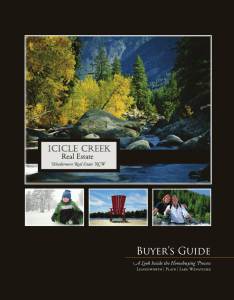Canadian Buying US Real Estate : 5 Things You Need to Know
International buyers are hot for US real estate these days; and one group is simply sizzling: Canadian buyers. In fact, the 2010 National Association of Realtors (NAR) Profile of International Home Buying Activity Report found that foreign real estate buyers comprised 4% of the US real estate market. Amazingly, Canadians accounted for 23% of the purchasers. The majority of Canadian buyers staked claims in Arizona (Phoenix leading the way) but California, Florida and Texas were also popular choices. We asked Chris Adams, of Arizona’s Show Appeal Realty, to tell us more. With luck this will help you if you are a Canadian buying US real estate.
photo © 2010 s.yume | more info (via: Wylio)
A strong Canadian dollar, a weak US real estate market, high prices at home, warm temps, and close proximity are just a few reasons why those from ‘up north’ find the US real estate market increasingly attractive. But before a Canadian takes the plunge into the US real estate market, there are a few things he or she needs to think about.
1. Why and Where To Buy?
The first question a potential Canadian buyer in the US real estate market needs to ask themselves is why and where to buy. Nearly all aspects of the potential real estate transaction will hinge on the answer to these two fundamental and absolutely critical questions. Why is the Canadian considering a real estate purchase in the US? Is the intent a second or vacation home, an investment, or some hybrid of the two? Where does the Canadian buyer intend to buy, and does this location support why they want to buy into the US real estate market? For example, if they are looking for a rental property, is the selected location likely to reward them with a successful return on investment?
2. Financing
While an impressive number of Canadian buyers cough off all-cash offers for their US real estate purchase, many still require financing. A Canadian resident looking for property in the US needs to think long and hard about the best way to attack financing across the border. One option is to go with an institution that has ties in both countries, keeping the transaction under one umbrella. Other options include financing through a Canadian bank that is clearly well established in the US, or a US bank that’s Canadian owned. In any event, financing over the border can get a bit tricky- it’s critical for the Canadian buyer to go with a lending institution that is very familiar with this sort of transaction.
3. Taxes and Insurance
Let’s be honest, taxes and insurance scare everyone. The tax and insurance implications for a Canadian purchasing US real estate can be numerable and thorny. A Canadian considering a US real estate purchase should halt any and all transactions until he or she is well educated in both territories. Consider that “non-resident” property taxes may apply to the real estate, and can be substantial. If the Canadian buyer does not spend long enough in the US during the tax year (more than 121 days) they won’t be considered a US resident. However, long stays may make them vulnerable to paying income tax in both countries. Owning a rental or investment property opens up entirely new tax and insurance implications (insurance being higher for rental properties.) Another note with regard to insurance: Canadian buyers must be aware that there are some areas of the US where property insurance is exorbitant (think coastal locations for example.) Not only can property insurance be expensive, it is down-right difficult to obtain (at whatever the cost) is some regions, as companies have determined the risk in the particular area is simply too great. The bottom line: a Canadian buyer of US real estate must seek out advice from a professional who is well-educated on the tax and insurance implications of an across the border real estate purchase.
4. The Purchase Process
The Canadian and US home buying process differs in a variety of ways. One of which is “deal to occupation” time. It is not uncommon to wait 60-90 days to “close” on a US property. Depending on the situation, this could present some logistical (thus financial) issues that should be considered by the buyer prior to an offer being placed.
5. Location
We’ve discussed how “where” a Canadian chooses to buy real estate in the US is a critical decision from which a number of outcomes will flow. That said, there’s nothing better than walking the neighborhood pavement. If this is a rental investment, are there many “for rent” signs dotting the streets? If so, what is the average asking price, vacancy rate, and can the potential purchase home complete in the local rental market while still turning a profit, or break even? Are yards well maintained? Houses respectably well-kept? Research crime stats on the web, visit the local police station for a feel of what types of crime they handle in the neighborhood. If this is a vacation or second home, knock on a door or two and chat with a prospective neighbor. If there are other homes for sale nearby, attend an open house. Take a peek around, investigate, take due diligence seriously. After all, location is key to real estate success.
While the US real estate market appears to have growing attraction to Canadian residents (with good reason,) there are a number of important location, investment and lifestyle considerations one should investigate before taking the plunge into the US market. Last but not least, Canadian buyers looking for property in the US should be cautious of exceptionally low priced homes, foreclosures and short sales. Often, foreclosures and short sales are synonymous with a “good deal,” but sometimes you get what you pay for. Working with a real estate and financial team that’s well schooled in their real estate market as well as across border real estate purchases may help minimize confusion and maximize return on investment.
Thanks again to our guest contributor: Show Appeal Realty, an Arizona real estate brokerage selling Scottsdale Homes and Gilbert real estate.


